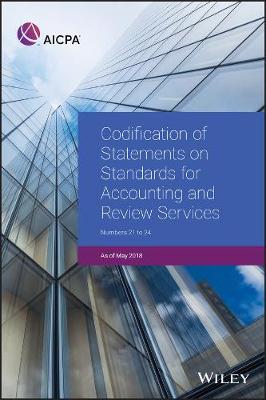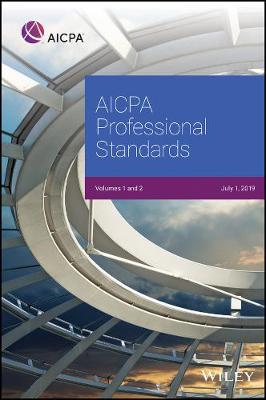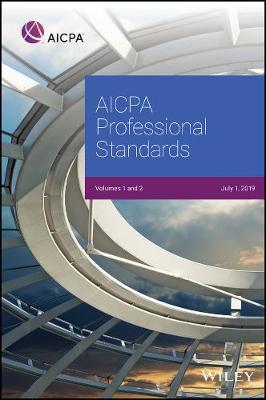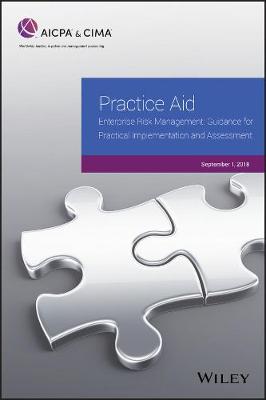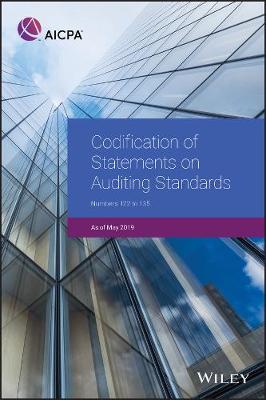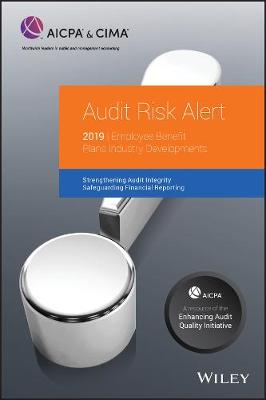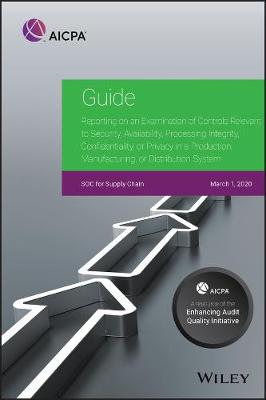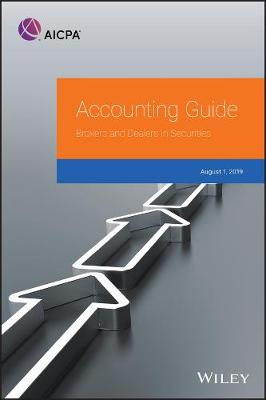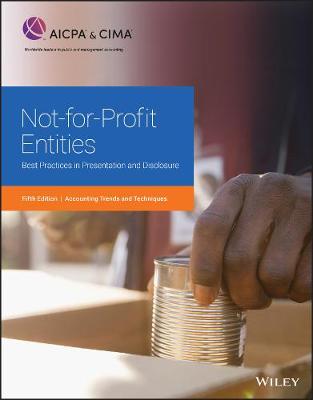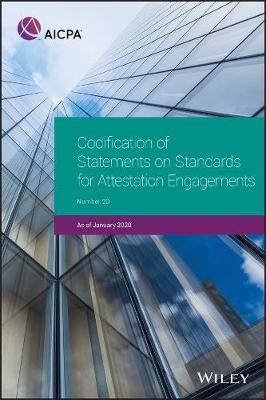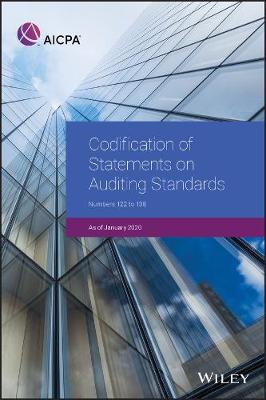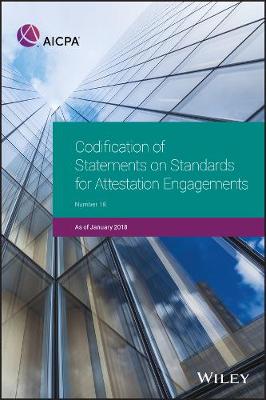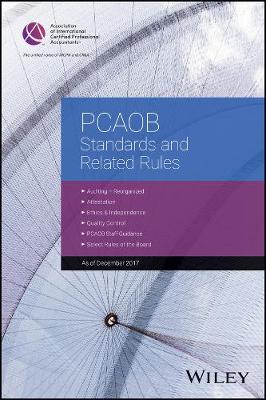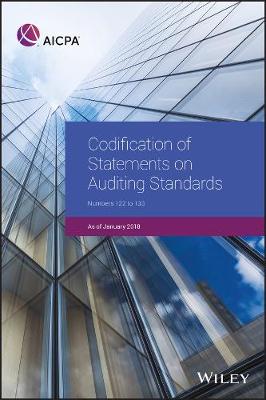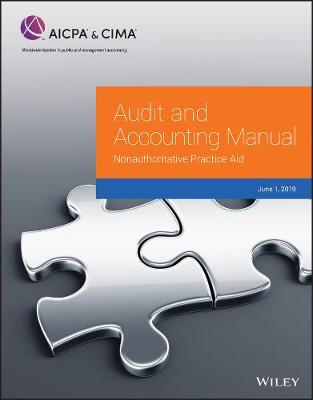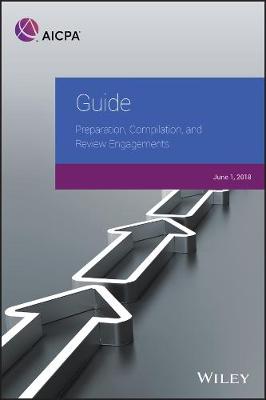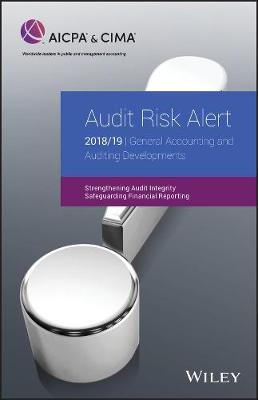AICPA
27 total works
Codification of Statements on Standards for Accounting and Review Services
by AICPA
The financial statements have been prepared in accordance with a financial reporting framework generally accepted in another country.
The compilation or review is to be performed in accordance with both SSARSs and another set of compilation or review standards.
Additional significant changes attributed to SSARS No. 24 include amendments to the following sections:
AR-C Section 60, General Principles for Engagements Performed in Accordance with Statements on Standards for Accounting and Review Services
AR-C Section 90, Review of Financial Statements
This codification is fully indexed and arranged by subject. The guidance (and related interpretations to the extent applicable) help apply the standards in specific circumstances and clearly show amendments, deleted or superseded portions, and conforming changes due to the issuance of other authoritative guidance.
Codification of Statements on Standards for Accounting and Review Services, Numbers 21–25
by AICPA
This book provides the requirements for performing engagements in accordance with Statements on Standards for Accounting and Review Services (SSARS). This updated edition includes the authoritative standards and interpretations applicable to preparation, compilation, and review engagements. The guidance and related interpretations will help you apply the standards in specific circumstances. The codification also clearly shows amendments, deleted or superseded content, and conforming changes due to the issuance of other authoritative guidance. The codification contains all SSARSs, including SSARS No. 21, which is now effective, through SSARS No. 25, Materiality in a Review of Financial Statements and Adverse Conclusions. SSARS No. 25 further converges AR-C section 90 with International Standard on Review Engagements (ISRE) 2400 (Revised), Engagements to Review Historical Financial Statements, and minimizes differences with the auditing standards regarding concepts that are consistent regardless of the level of service performed on the financial statements.
Updated as of July 1, 2019, this two-volume set is a comprehensive source of professional standards and interpretations issued by the AICPA, such as auditing and attestation, accounting and review services pronouncements, along with the AICPA Code of Professional Conduct and Bylaws. Standards and related interpretations, to help you apply the standards in specific circumstances, are arranged by subject with amendments noted, superseded portions deleted, and conforming changes reflected.
New to this edition:
- Statement on Auditing Standards (SAS) No. 134, Auditor Reporting and Amendments, Including Amendments Addressing Disclosures in the Audit of Financial Statements
- SAS No. 135, Omnibus Statement on Auditing Standards—2019
- SAS No. 136, Forming an Opinion and Reporting on Financial Statements of Employee Benefit Plans Subject to ERISA
- SAS No. 137, The Auditor's Responsibilities Relating to Other Information Included in Annual Reports
- Statement on Standards for Forensic Services No. 1, Statement on Standards for Forensic Services
Updated as of July 1, 2019, this two-volume set is a comprehensive source of professional standards and interpretations issued by the AICPA, such as auditing and attestation, accounting and review services pronouncements, along with the AICPA Code of Professional Conduct and Bylaws. Standards and related interpretations, to help you apply the standards in specific circumstances, are arranged by subject with amendments noted, superseded portions deleted, and conforming changes reflected.
New to this edition:
- Statement on Auditing Standards (SAS) No. 134, Auditor Reporting and Amendments, Including Amendments Addressing Disclosures in the Audit of Financial Statements
- SAS No. 135, Omnibus Statement on Auditing Standards--2019
- SAS No. 136, Forming an Opinion and Reporting on Financial Statements of Employee Benefit Plans Subject to ERISA
- SAS No. 137, The Auditor's Responsibilities Relating to Other Information Included in Annual Reports
- Statement on Standards for Forensic Services No. 1, Statement on Standards for Forensic Services
This publication includes invaluable guidance for anyone responsible for or advising on an enterprise risk management process (ERM), whether the process is in its early stages or is already well established. This resource will help ensure the ERM process is well designed, well executed, and ultimately successful. Global, economic, and regulatory conditions as well as everyday internal risks can affect business operations, so it is important to have a process in place that identifies these events and manages risks. This guide leverages the concepts of existing frameworks as a foundation for providing illustrative examples, best practices, and guidance for implementing or assessing an enterprise risk management process.
This 2019 edition delivers the current Statements on Auditing Standards (SASs) and related interpretations in a codified format, giving accountants the most up-to-date information, they need to conduct successful audits and provide high-quality services to their clients.
Issued directly from the AICPA, this authoritative guidance is essential to fully understand the requirements associated with an audit. This edition includes the following new standards:
- SAS No. 134, Auditor Reporting and Amendments, Including Amendments Addressing Disclosures in the Audit of Financial Statements
- SAS No. 135, Omnibus Statement on Auditing Standards—2019
- SAS No. 134 is a suite of auditor reporting standards that includes a new AU-C section 701, Communicating Key Audit Matters in the Independent Auditor’s Report, and replaces AU-C sections 700, 705, and 706.
- SAS No. 134, which also amends various other AU-C sections, addresses the auditor’s responsibility to form an opinion on the financial statements and the form and content of the auditor’s report issued because of an audit of financial statements. It also addresses the auditor’s responsibilities, and the form and content of the auditor’s report, when the auditor concludes that a modification to the auditor’s opinion on the financial statements is necessary, and when additional communications are necessary in the auditor’s report.
- SAS No. 135 is intended to more closely align ASB guidance with the PCAOB's standards by primarily amending AU-C section 260, Communications With Those Charged With Governance, AU-C section 550, Related Parties, and AU-C section 240, Consideration of Fraud in a Financial Statement Audit.
The increasing complexity of employee benefit plan auditing and focus by the Department of Labor have resulted in significant pressure for CPAs and firms performing EBP audits. To help CPAs meet the challenge of performing quality audits in this unique and complex area, the AICPA has developed this alert to assist in identifying current sources of risk within EBP audit engagements.
Written by a task force consisting of current and former employee benefit plan expert panel members, this alert features discussions on new developments and issues that auditors may face in their current audits, as well as a look at what's in the pipeline that may affect your engagements.
Updates in 2019:
- FASB ASU No. 2017-06, Employee Benefit Plan Master Trust Reporting
- FASB ASU No. 2018-09, Codification Improvements
- FASB ASU No. 2018-13, Fair Value Measurement (Topic 820), Disclosure Framework–Changes to the Disclosure Requirements for Fair Value Measurement
Financial statement preparation for not-for-profit entities can be complex. Whether you are preparing or auditing them, you'll find the tools you need in this helpful resource.
This checklist contains the most comprehensive financial reporting and disclosure guidance available, plus a complete set of illustrative financial statements to assist you in understanding and applying standards like ASU 2016-14, 2018-08, and 2014-09.
Key features include:
- Designed to assist auditors and preparers in overcoming the complexities of financial statement preparation for not-for-profit entities.
Internal and external forces such as globalization, global interconnectivity, automation, and other technological advancements are making today's supply chains highly sophisticated and complex. For organizations that produce, manufacture or distribute products, there's often a high level of interdependence and connectivity with their suppliers and their customers and business partners.
Although the interconnectedness of these organizations can be beneficial (increased revenues, expanded market opportunities, and cost reduction), the ability of organizations to meet their goals is often increasingly dependent on events, processes, and controls that are not visible and are often beyond their control – such as a supplier's controls. That's why the demand for transparency in supply chains is now higher than ever before, and why this is the perfect time for you to help organizations assess their supply chain risks, evaluate the system controls within their manufacturing, production, or distribution systems, and communicate their supply chain management efforts to those with whom they do business.
Accountants and financial managers can also increase the credibility of the supply chain information communicated by the organization by providing an opinion on the organization's supply chain efforts. This guide enables the accountant and financial manager to examine and report on the description of a system for manufacturing, producing and distributing goods as well as on the controls within that system using a dynamic, proactive, and agile approach. It will show how to conduct this examination in accordance with the attestation standards. The guide may also be helpful when providing readiness assessments to clients, who are not quite ready for an examination level service and need help to get there.
The guide also includes excerpts from the two distinct, but complementary sets of criteria developed by the AICPA to assist practitioners with SOC for Supply Chain engagements: the description criteria and the 2017 trust services criteria.
It is critical to understand the complexities of the specialized accounting and regulatory requirements needed for the broker-dealer industry. This comprehensive guide has been designed to be beneficial for a wide range of professionals within the broker-dealer industry. Updates to this edition are to conform the content to current accounting standards and regulatory requirements. The updates include:
- SEC Release No. 34-86073, Amendment to Single Issuer Exemption for Broker-Dealers;
- ASU No. 2018-09, Codification Improvements; and,
- SEC Release Nos. 33-10532; 34-83875; IC-33203, Disclosure Update and Simplification.
In addition, this edition features a new example disclosure note for revenue from contracts with customers, which has been added to the guide's illustrative financial statements and footnote disclosures.
This valuable resource provides financial statement presentation and disclosure examples illustrating U.S. GAAP compliance for the topics most frequently encountered by preparers of financial statements for not-for-profits (NFPs) by drawing from the audited financial statements of an assortment of NFP entities.
Intended for use as a tool to help you create and verify the format and accuracy of your company's or clients' financial statements, this resource walks you through the most common presentations used by other nonprofits for challenges such as noncash gifts, donor-imposed restrictions, and functional expenses.
The 2019 edition illustrates the most important, immediate, and challenging disclosures, including:
- Net asset classes and donor-imposed restrictions
- Investments, derivatives, endowments, and UPMIFA
- Liquidity and availability of resources
- Liabilities, including split-interest agreements and pension plans
- Contributions and revenue recognition, including grants, contracts, gifts in kind, interests in trusts, and other receivables
- Analysis of expenses by function and nature
- Fair value measurements and use of estimates
- Income taxes and uncertain tax positions for tax-exempt entities
- Measure of operations and joint costs
Codification of Statements on Standards for Attestation Engagements – 2020
by AICPA
This 2020 edition delivers the current clarified Statements on Standards for Attestation Engagements (SSAEs) and related interpretations in a codified format, providing the most up-to-date information needed to perform attestation engagements. This authoritative guidance, issued directly by the AICPA, is essential to fully understanding the requirements associated with an attestation engagement.
This edition includes the following new standards:
- SSAE No. 19, Agreed-Upon Procedures Engagements
- SSAE No. 20, Amendments to the Description of the Concept of Materiality
Codification of Statements on Auditing Standards, Numbers 122 to 138 – 2020
by AICPA
This 2020 edition delivers the current Statements on Auditing Standards (SASs) and related interpretations in a codified format, giving up-to-date information needed to conduct successful audits and provide high-quality services to clients.
Issued directly by the AICPA, this authoritative guidance is essential to fully understand the requirements associated with an audit.
This edition includes the following new standards:
- SAS No. 136, Forming an Opinion and Reporting on Financial Statements of Employee
- Benefit Plans Subject to ERISA
- SAS No. 137, The Auditor's Responsibilities Relating to Other Information Included in
- Annual Reports
- SAS No. 138, Amendments to the Description of the Concept of Materiality
Codification of Statements on Standards for Attestation Engagements, January 2018
by AICPA
This title provides the current clarified Statements on Standards for Attestation Engagements (SSAEs) and related interpretations in a codified format, providing accountants with the most up-to-date information needed to perform attestation engagements. This authoritative guidance, issued directly by the AICPA, is essential to fully understanding the requirements associated with an attestation engagement. In addition to SSAE No. 18, Attestation Standards: Clarification and Recodification, which is now effective, this edition includes the following new standard:
- Interpretation No. 4, "Performing and Reporting on an Attestation Engagement Under Two Sets of Attestation Standards," of AT-C section 105, Concepts Common to All Attestation Engagements
This codification is fully indexed and arranged by subject. The codified standards and related interpretations are vital to practitioners performing attestation engagements.
Pursuant to PCAOB Release No. 2017-001, The Auditor's Report on an Audit of Financial Statements When the Auditor Expresses an Unqualified Opinion and Related Amendments to PCAOB Standards, dated June 1, 2017, the PCAOB adopted a new auditor reporting standard and related amendments that will require the auditor to provide new information about the audit and make the auditor's report more informative and relevant to investors and other financial statement users. The standard and related amendments were subsequently approved by the SEC on October 23, 2017, and are effective as of audits of fiscal years ending on or after December 15, 2017 (except for the "Critical Audit Matters" section of the standard and related amendments, which have a phased effective date).
This 2018 edition of the AICPA's PCAOB Standards and Related Rules includes the newly approved standard The Auditor's Report on an Audit of Financial Statements When the Auditor Expresses an Unqualified Opinion (AS 3101). In addition, this title also features updated staff guidance, included a new question and answers section, updated guidance for firms filing the new Form AP, and a new Staff Audit Practice Alert to assist auditors in applying PCAOB standards when auditing companies' implementation of the new FASB revenue accounting standard.
This authoritative guidance, issued directly from the AICPA, is essential to fully understand the requirements associated with an audit. This edition includes the following new standard:
SAS No. 133, Auditor Involvement With Exempt Offering Documents
This codification is fully indexed and arranged by subject. The codified standards and related interpretations are vital to practitioners performing audits.
This comprehensive, step-by-step guide provides a plain-English approach to planning and performing audits. In this handy resource, accountants and auditors will find updates for the issuance of SAS No. 132, The Auditor's Consideration of an Entity's Ability to Continue as a Going Concern, with illustrative examples, sample forms and helpful techniques ideal for small- and medium-sized firms
Key Features include:
- Comprehensive and step-by-step guidance on the performance of an audit
- Numerous alerts that address the current-year developments in a variety of areas
- Illustrative examples and forms to facilitate hands-on performance of the audit
Audit Risk Alert: General Accounting and Auditing Developments 2018/19
by AICPA
Recent Economic Trends
Recent Legislative and PCAOB Developments
Developments in Peer Review
Recent Ethics Interpretations
This useful resource also contains new accounting and auditing guidance related:
Derivatives and Hedging
Service Concession Agreements
Discontinued Operations
Stock Compensation
